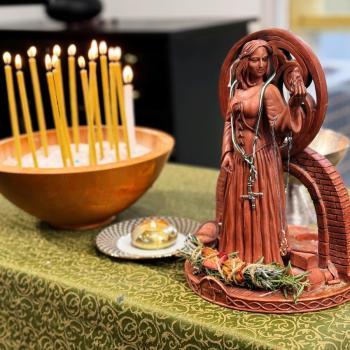To arrive at Mount St. Scholastica Monastery in Atchison, Kansas, you must cross Contrary Creek, drive alongside God's Mountain Camp, and by-pass Last Chance Road. Eventually you will see a red brick structure on a hilltop, its L-shaped wings like outstretched arms embracing the city below.
In the summer of 2008, I began making regular visits to this Benedictine monastery for women in the heart of America's heartland. I had come originally to present a workshop on touching the sacred through poetry. The visit capped a particularly hectic stretch of speaking. On weekends, I often lead spiritual retreats for busy professionals, all the while working my "day job" during the week, covering religion news for PBS-TV and other outlets.
My first afternoon at the monastery, I sat alone in its oak-trimmed chapel. Silence seemed to saturate the walls, the ceiling. I wondered how I was going to talk to a retreat group later that day about nourishing the soul when I hadn't fed my own soul a decent meal in months.
I looked up at one of the chapel's stained glass windows. Some words were written in Latin, omni tempore silentio debent studere. Roughly translated: At all times, cultivate silence. I realized how "talked out" I had become. The paradox I had been living stared me in the face. I loved my work and had accomplished much in my career. What I lacked were moments of silence and solitude when I could simply be. Without them, I was losing drop by drop the inner resources I needed to do my work well and cultivate an interior life.
I began to sense that these monastic women had something to teach me I couldn't find in the self-help books promising married, professional women like me that we can have it all. One of the first sisters I met was ninety-year-old Sister Lillian Harrington. At one point I disclosed to her that I've always had a terrible fear of death. I sometimes wake at night trembling at the thought that I, too, am one day going to die. I asked Sister Lillian if, at her age, she thinks often about death. She drilled her pale blue eyes into mine and told me something I've never forgotten. "I don't think about dying," she said. "I think about living."
Whenever I return to Mount St. Scholastica, I feel as though I enter a deeper reality. The sisters wake before dawn for community prayer. They pray for the unemployed, the sick, the dying, for victims of crime and prisoners on Death Row. They pray for the current Democratic president as they did for the past Republican president. They pray for world leaders, an end to war. Whatever slender thread is holding our planet together, preventing us from blowing each other apart, just might stem from the prayers of these monastic women and others like them across the world.
I began to see how monastic practices could have practical application in my own professional life. In the past, whenever sisters were assigned to work together on a project, they would bow to each other and say, "Have patience with me." I often think how much more pleasant my work day would be if, setting out to report a story for PBS, I bowed to my producer, bowed to the camera person and the audio technician, and they to me, and we asked each other to please have patience with our human frailties.
Still, much of what passes for wisdom in a monastery might seem like foolishness to the rest of the world. Or is it? Benedictines take a vow of stability, promising to remain in the same monastery their entire lives. Having lived in four states and three European cities throughout my career, such a lack of mobility ran counter to my Americanized notion of success. But I can see now the value of staying put. As one sister explained it, stability recognizes "we do not need to go elsewhere because everywhere is here."
Unlike cloistered monastics, Benedictines can work outside the monastery. Many Mount sisters have been college professors. One is a medical doctor, another a funeral director. Still another worked as a firefighter. But within the monastery, everyone from the Ph.Ds to the newest novices takes a turn at cleaning the bathrooms, mopping the floors, and washing the dishes (albeit in an industrial-size mechanical dishwasher). Monasteries, it appears, discovered "servant leadership" long before it entered the lexicon of management gurus. Only here, it isn't merely an empty slogan. Here, humility still equates with its original Latin root, humus, meaning "of the earth." Humility recognizes we're all in this together.
Perhaps the most important word I've learned from the sisters is conversatio. It refers to a vow Benedictines take for "conversion of life." But I prefer the definition Sister Thomasita Homan gives of conversatio as a constant turning, a continuous "conversation" with life. I like this notion of turning because it connotes change, and there is so much about myself I'd like to change, like my quick temper. One day, returning from the monastery, I argued with my wonderful husband. A silly, totally unnecessary, argument. I asked Sister Thomasita why I'm calm and patient when I'm at the monastery, but can't seem to live conversatio in my daily life. "You are living conversatio, she said. "Your struggle, that's the conversatio." Her words gave me hope. I don't have to be a saint. I can just be human.
I used to think monasteries were hopeless throwbacks to the past. Now I see them as windows to the future, a future our world desperately needs—one that stresses community over competitiveness, service over self-aggrandizement, simplicity over consumption, and quietude over constant chatter. It's what keeps me returning to these incredible Benedictine women and this monastery perched on a hill.
For more conversation on Atchison Blue, visit the Patheos Book Club here.
12/2/2022 9:05:38 PM




